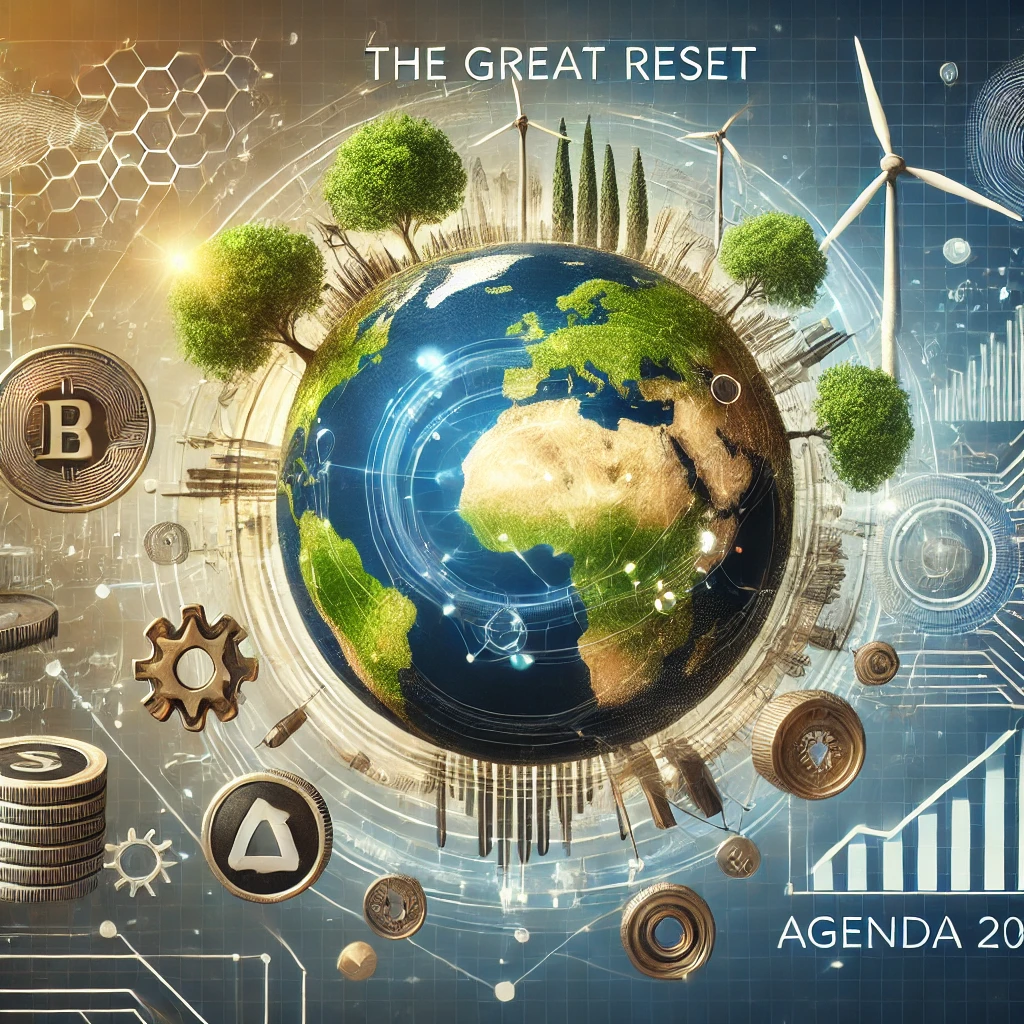The Great Reset and Agenda 2030 are globalist frameworks with desired global economic and societal implications. Policymakers and international institutions envision a more sustainable and equitable world, but these shifts also present challenges and opportunities for individuals pursuing Financial Independence Retire Early (FIRE) to be aware of. This article provides an initial exploration of these frameworks to build upon, including the response from BRICS nations, background on the Sustainable Development Goals (SDGs), and their collective impact on FIRE strategies.
What Is the Great Reset?
The Great Reset, introduced by the World Economic Forum (WEF) in 2020 amid the COVID-19 pandemic, aims to reshape the global economy to address systemic risks such as inequality, climate change, and technological disruption. It is known for the ‘you will own nothing and be happy’ tagline. Its surface-level objectives include:
- Sustainable Development: Fostering green energy, circular economies, and reduced carbon footprints.
- Stakeholder Capitalism: Moving beyond profit-driven models to prioritize social and environmental outcomes.
- Technological Transformation: Promoting digital innovation, AI, and Central Bank Digital Currencies (CBDCs).
- Global Cooperation and Wealth Redistribution: Encouraging multilateral collaboration and social policies like universal basic income (UBI) to reduce inequality.
What Is Agenda 2030?
Agenda 2030, adopted by the United Nations in 2015, is a global blueprint for sustainable development through 17 Sustainable Development Goals (SDGs). These noble goals reflect a collective effort to tackle pressing challenges, including poverty, inequality, environmental degradation, and economic instability.
Key SDGs include:
- No Poverty (SDG 1): Eradicate poverty in all its forms.
- Zero Hunger (SDG 2): End hunger, achieve food security, and promote sustainable agriculture.
- Good Health and Well-Being (SDG 3): Ensure healthy lives and promote well-being.
- Affordable and Clean Energy (SDG 7): Expand access to renewable energy sources.
- Climate Action (SDG 13): Take urgent steps to combat climate change and its impacts.
- Decent Work and Economic Growth (SDG 8): Promote sustainable economic growth and productive employment.
BRICS Response to the Great Reset and Agenda 2030
BRICS (Brazil, Russia, India, China, and South Africa) is a coalition of emerging economies with growing geopolitical influence. While the BRICS nations are not directly opposed to Agenda 2030, their responses often reflect alternative priorities to the Western-led economic frameworks proposed by the Great Reset and the SDGs. Key aspects of their approach include:
- Energy Sovereignty: BRICS nations, particularly Russia, China, and India, emphasize energy independence and the use of fossil fuels, contrasting with the green energy focus of the Great Reset.
- Development Finance: The BRICS New Development Bank aims to provide infrastructure funding without the political conditions associated with Western financial institutions like the IMF or World Bank.
- Decentralization and Multipolarity: BRICS countries advocate for a multipolar world order, resisting Western hegemony in international governance and finance.
- De-dollarization Efforts: A growing trend among BRICS nations is the shift away from the U.S. dollar in trade and finance, which could impact global markets and financial planning strategies for FIRE enthusiasts.
Impact of the Great Reset and Agenda 2030 on FIRE
For those pursuing FIRE, these global changes can present both challenges and opportunities. Let’s explore the key ways in which these frameworks impact FIRE strategies.
Potential Challenges
- Taxation and Redistribution: Many governments are considering higher taxes on wealth and investments to fund social programs aligned with the SDGs. Wealth taxes, increased capital gains taxes, and new levies could slow the accumulation of wealth required for early retirement.
- Inflation and Rising Living Costs: As economies shift toward green energy and sustainable infrastructure, inflationary pressures could increase. Higher living costs may require FIRE enthusiasts to revise their financial targets.
- Financial Surveillance through CBDCs: Central Bank Digital Currencies could offer governments more control over individual spending and savings, reducing financial privacy and making it harder to move wealth across borders.
- Reduced Growth in Traditional Markets: Some sectors that FIRE enthusiasts rely on for passive income, such as fossil fuels or traditional consumer goods, may face regulatory pressures or reduced profitability due to shifting market dynamics.
Opportunities for FIRE Enthusiasts
- Geoarbitrage and Remote Work: The emphasis on digital transformation, spurred by the Great Reset, aligns with FIRE principles. Increased opportunities for remote work and digital nomadism allow individuals to leverage geoarbitrage—earning in higher-cost countries while living in more affordable regions.
- ESG Investing and Green Portfolios: As sustainability becomes a global priority, Environmental, Social, and Governance (ESG) investments offer a new avenue for long-term growth. FIRE investors can align their portfolios with these trends to benefit from policy incentives and growing demand for sustainable businesses.
- Minimalism and Responsible Consumption: The focus on responsible consumption in Agenda 2030 complements the FIRE mindset of frugality and conscious spending. FIRE enthusiasts can further reduce expenses by embracing minimalism and sustainable living.
- Alternative Investments through Decentralized Finance (DeFi): As financial systems evolve, decentralized finance offers new ways to build wealth through cryptocurrencies and peer-to-peer lending platforms. These tools provide autonomy and flexibility outside traditional banking structures.
Adapting FIRE Strategies in a Changing World
With the economic and societal shifts driven by the Great Reset and Agenda 2030, FIRE enthusiasts must adapt their strategies to remain resilient. Here are some practical ways to prepare:
- Diversify Income Streams: Explore multiple income sources, including real estate, freelance work, sustainable investments, and crypto assets, to reduce dependency on any single sector.
- Inflation-Proof Investments: Incorporate inflation-resistant assets, such as real estate, precious metals, or Treasury Inflation-Protected Securities (TIPS), into your portfolio.
- Stay Informed about Policy Changes: Keep track of tax reforms and regulatory shifts that could affect investment returns and retirement plans.
- Develop Location Independence: Embrace remote work and digital tools to unlock flexibility and lower living costs through geoarbitrage.
- Align Investments with Sustainability Trends: Consider ESG funds or green businesses that are likely to benefit from government incentives and future growth.
References
- World Economic Forum. (2020). The Great Reset Initiative.
- United Nations. (2015). Transforming Our World: The 2030 Agenda for Sustainable Development.
- International Monetary Fund. (2021). Policy Responses to the COVID-19 Pandemic.
- BRICS. (2023). BRICS Expansion and Development Finance Report.
- Bank for International Settlements. (2022). Central Bank Digital Currencies: A New Frontier in Monetary Policy.
Discover more from Kango Anywhere
Subscribe to get the latest posts sent to your email.




